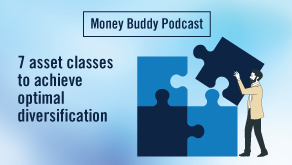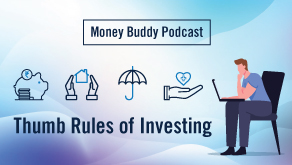PLAN YOUR RETIREMENT
Build a stable stack of funds to help you retire in peace.
Once you’re close to retirement or have already retired, your life becomes different. Certain changes define life after retirement. Some of the positive changes are that you get are plenty of free time, and the option to relax and enjoy a life of leisure.
3min read
HOW TO GET STARTED
Want to understand how "finally" to get started? Absorb in the pool of knowledge to get a head start.
5 ways to fund your dream family vacation after retirement
Retirement begins a new chapter of your financial planning journey. In this phase, your personal finance goals shift towards sustaining the flow of income and ensuring your funds don’t get depleted while managing your expenses. Good investment planning will help ensure that you don’t fall short of funds for your endeavours.
However, retired life isn’t just about meeting your expenses, it’s also about enjoying your leisure time and doing what you enjoy. If a dream family vacation is on your bucket list, here are five steps to make it happen:
Jan 2022
7min read
How to Save Up for Travel in Retirement
After retirement, your salary income will stop, but your lifestyle should not be diminished. The goal of financial planning through your life is to have sufficient funds to continue and even improve your lifestyle post-retirement. Ideally, you want to be able to live some of the dreams you couldn’t afford when you were younger – and seeing the world is foremost among them.
Mar 2022
3min read
How Can You Use a Systematic Withdrawal Plan After Retirement?
The Systematic Withdrawal Plan (SWP) allows you to withdraw money from your
existing mutual fund at fixed intervals of your choosing over a period of time.
Jan 2023
3min read
How To Choose Fulfilling Pursuits After Retirement
Retirement is the time to stop settling for less and start pursuing your passions. Freed from most responsibilities, this phase of life is the best time to relax , fulfil one’s personal goals and tick off that bucket list!
Feb 2022
3min read
How to Manage Your Retirement Income
In this special phase of your life, managing your expenses is a major priority. Here’s how to manage your retirement income so that you can continue to meet your financial goals and live the lifestyle you want.
Jan 2023
3min read
SECURE YOUR FUTURE
Secure your future as you prepare the next leg. Take the right steps to ensure a stable innings.
Household Budgeting
An easy and smart guide to managing your household expenses effectively
Protect
Shield yourself and your loved ones with robust insurance planning
As you cross the milestone of retirement, you can begin to enjoy the fruits of your financial planning – but the planning doesn’t end here. New responsibilities and tasks emerge as you begin to build your legacy and the future of your family, by drafting a will and pursuing estate planning. This is a continuation of your goal-based financial planning journey, designed to ensure your post-retirement personal finances are secured.
4min read
Save & Invest
Save and invest for your secure future
Whether it’s your office desk, wardrobe or portfolio, decluttering helps you organize things in a better way. When it comes to our finances, we may have invested in a variety of products through different intermediaries like banks, MFDs, insurance agents and opened multiple bank accounts. Keeping track of everything may become a challenge.
Here are a few benefits of consolidating your portfolio.
Sometimes, simplicity is better. When you keep all or most of your investments in one place, you just need to remember one username and password, and one customer support contact.
You can also save time and paper by reducing the number of individual statements you get, whether electronically or by mail.
3min read
Retirement marks a new chapter of your financial journey, as the financial and investment planning goals of a lifetime come to fruition. Yet many retirees still have a nagging fear that they might run out of money, since their steady salary income stops while their expenses endure.
3min read
As you approach retirement, you enter a new phase of financial planning, guided by new goals, anxieties and ambitions. The rise in life expectancy has made it even more important to plan well for retirement, so that you have enough money to lead a long, comfortable retired life.
4min read
Most people prepare for retirement by saving and investing throughout their working life. During retirement, your financial goals and approach to financial planning will undergo a change, as your priorities shift to maintaining your lifestyle and securing your legacy. At the same time, it’s important to continue with your investments even during the retirement phase of life.
Let’s take a look at the six key investment options available to you in retirement:
4min read
After spending the majority of our adult life in employment, it can be a bit overwhelming to switch to being dependent on passive income. But with strong financial and investment planning, retirement can be a genuinely fulfilling experience. You can reorient your personal finance goals to help you pursue your dreams and passions – travel, a new hobby etc.
4min read
CALCULATE FINANCIAL GOALS
Plan and achieve your goals with the help of these calculators
Goal SIP Calculator
We help you plan for your life goals, with great ease!
Retirement Calculator
Calculate how much you need for a comfortable retirement
PODCAST
In PGIM India podcast series, we bring you insights on money management and personal finance to help you make smart investment decisions
INTERESTING SECTIONS THAT YOU MAY WANT TO EXPLORE
The following sections may interest you, and you may want to explore them more in detail
PGIM India Asset Management Private Limited
(CIN - U74900MH2008FTC187029)
Toll Free Number: 1800 266 7446
Email: care@pgimindia.co.in
This is an Investor Education and Awareness Initiative by PGIM India Mutual Fund.
All the Mutual Fund investors have to go through a one-time KYC (Know Your Customers) process. Investor should deal only with the Registered Mutual Funds (RMF). For more info on KYC, RMF and procedure to lodge/redress
any complaints, visit
https://www.pgimindiamf.com/ieid.
MUTUAL FUND INVESTMENTS ARE SUBJECT TO MARKET RISKS, READ ALL SCHEME RELATED DOCUMENTS CAREFULLY.
Read more
The information contained herein is provided by PGIM India Asset Management Private Limited (the AMC)
on the basis of publicly available information, internally developed data and other third-party
sources believed to be reliable. However, the AMC cannot guarantee the accuracy of such information,
assure its completeness, or warrant such information will not be changed. The information contained
herein is current as of the date of issuance* (or such earlier date as referenced herein) and is
subject to change without notice. The AMC has no obligation to update any or all of such
information; nor does the AMC make any express or implied warranties or representations
as to its completeness or accuracy. There can be no assurance that any forecast made
herein will be actually realized. These materials do not take into account individual
investor's objectives, needs or circumstances or the suitability of any securities,
financial instruments or investment strategies described herein for particular investor. Hence,
each investor is advised to consult his or her own professional investment / tax advisor / consultant for advice in this regard.
The information contained herein is provided on the basis of and subject to the explanations, caveats and warnings set out elsewhere herein.
The views of the Fund Manager should not be construed as an advice and investors must make their own investment decisions regarding investment/ disinvestment in securities market and/or suitability of
the fund based on their specific investment objectives and financial positions and using such independent advisors as they believe necessary.















